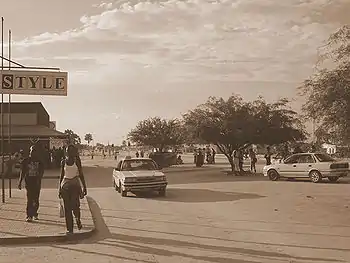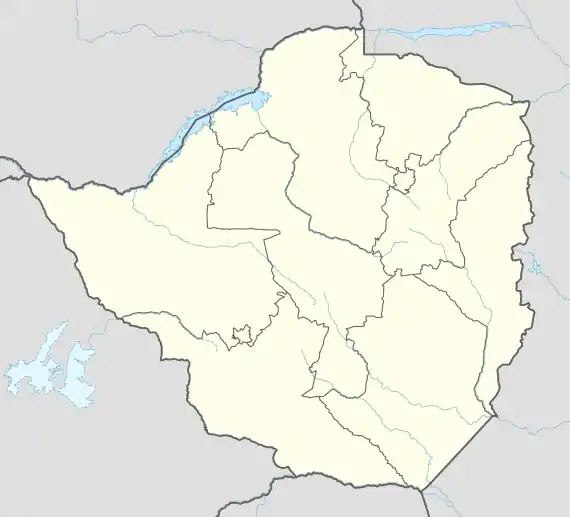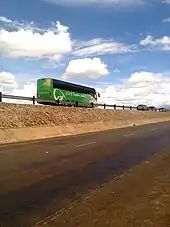Mabvuku
Mabvuku is a high density suburb some 17 km east of Harare, the capital city of Zimbabwe. It is classified as a suburb or township of Harare, with Harare City Council constituting local government. It encompasses in particular the townships that include Old Mabvuku and New Mabvuku, and more generally Old Tafara, and New Tafara (the latter two constituting Tafara properly speaking). Chizhanje is a former dormitory suburb of hostels very close to Old Mabvuku that is nominally part of Mabvuku.
Mabvuku | |
|---|---|
Suburb, Township, Town | |
 " Scene at Kamunhu, one of the main shopping centres during the 20th century. In the 21st century a lot has changed".- Endurance Muunganirwa and Snr
Rodney Mubvakure | |
| Nickname(s): bvakaz | |
 Mabvuku | |
| Coordinates: 17°53′24″S 31°8′51″E | |
| Town | Mabvuku |
| Elevation | 1,473 m (4,833 ft) |
| Population (2018) | |
| • Total | over 30,000(estimated ) |
| Time zone | +2:00 |
Old Mabvuku dates back to the 1950s, with the oldest school in the suburb, Donnybrook Primary School dating back to 1954. New Mabvuku was built starting 1972 by the then Salisbury city council. Lately there have been expansions north and east via efforts by would be house owners through membership of housing cooperatives and voluntary contributions.
Etymology
The origins of the Word "Mabvuku" are not very certain. Possibly from the Shona "-bvuku"–, ideophone for emerging, to denote the water sprouting out of the numerous swamps around the area. Ma- (place of)+ -bvuku (emerging waters) is a plausible etymology.
Climate
| Climate data for Mabvuku | |||||||||||||
|---|---|---|---|---|---|---|---|---|---|---|---|---|---|
| Month | Jan | Feb | Mar | Apr | May | Jun | Jul | Aug | Sep | Oct | Nov | Dec | Year |
| Average high °C (°F) | 26 (78) |
25 (77) |
25 (77) |
25 (77) |
23 (73) |
21 (69) |
21 (69) |
23 (73) |
26 (78) |
28 (82) |
28 (82) |
26 (78) |
24 (75) |
| Average low °C (°F) | 15 (59) |
15 (59) |
14 (57) |
12 (53) |
8 (46) |
6 (42) |
5 (41) |
7 (44) |
10 (50) |
13 (55) |
15 (59) |
15 (59) |
11 (51) |
| Average precipitation mm (inches) | 210 (8.4) |
160 (6.3) |
91 (3.6) |
38 (1.5) |
7.6 (0.3) |
2.5 (0.1) |
2.5 (0.1) |
2.5 (0.1) |
7.6 (0.3) |
36 (1.4) |
99 (3.9) |
180 (7) |
840 (32.9) |
| Source: Weatherbase[1] | |||||||||||||
History
Mabvuku was the home of the VaShawasha people before colonisation. The Shawasha people of the Soko Mbire clan settled in this area c300years ago. Mabvuku as opposed to the present day site of Chishawasha is the native home of these people. The present site of Chishawasha village was given its prominence by the establishment of the oldest Catholic Mission Church there.
The ancestors of the Shawasha people are commemorated in the street and road names of Old Mabvuku, namely, Tingini, Godzonga, Marembo, Chauruka, Nyamare, Nyahuni, Chaitezvi, Nzwere, Shambare and Chatima's compilation of the praise poetry of the Shona corroborates these facts.
Ethnicities
Mabvuku and Tafara have an unusually high concentration of people of Malawian especially the Chewa who brought gule wamkulu popularly known as zvigure. It has also a high concentration of the Yawo people who are predominantly Muslims. The Yawo people are known with a derogatory name of achawa or machawa. Zimbabweans of Malawian origin are also known by derogatory terms such Mabhurandaya or Manyasa. Mabvuku has also a number of people of Mozambique and Zambian origin who migrated to seek work mostly before independence. They formed a vast pool of labour as domestics for the nearby suburbs of Highlands, Greendale, Msasa etc., with some working in the industrial area of Msasa and the nearby (1 km north) Portland cement factory. With expansion in numbers in recent years the people of Mabvuku have found some of them working as far afield as Willowvale and Workington (Harare) industrial areas to the west of Harare. In the seventies and eighties it was not unusual to see Nyau (Chigure) dancers, or Muganda extravaganza's owing to the high population of foreign origin. The concept of burial societies, originating in ethnic communities has had general adoption by the indigenous population owing to its benefits.
Religion
There is a lively religious scene in Mabvuku. A number of denominations have representations including the Catholics, Anglicans, Presbyterians, Wesleyans, Salvation Army, Seventh-day Adventists, Methodists, the various Apostolic groups (Va-Apostora) among others. Attendance is typically very high at the Catholic Church in Old Mabvuku, with two packed services on Sunday morning. Mabvuku has also a mosque where Muslims worship their God (Allah). Muslims pray five times a day in that mosque and during the ninth month of an Islamic calendar (Ramadhan), you will notice them breaking the fast at sunset within the mosque. They also conduct some circumcision sessions with the support of the Imam. On the other hand, some Yawo prefer sending their children to be circumcised at ndagala than the hospital. In doing so they try to maintain their culture which they believe is no longer static in Zimbabwe. A good number of Muslims belong to the Yawo tribe with a small number of the Nyaja who came from Malawi. The conversion of the Yawo to Islam has a long history. The Yawo converted to Islam before David Livingstone saw Lake Malawi in 1859. He found the Yawo well dressed, reading and writing using Arabic alphabets. This did surprise Europeans who could not believe seeing an African reading and writing in Malawi by that time. Being the first people to be converted to Islam they have carried the fires of Islam burning in Zambia, Zimbabwe, Botswana and South Africa. It is the Yawo people who have been converting indigenous people in the side countries through proselytizing, good conduct, marriages and settlements.
Education
There are three public high schools in Mabvuku, viz. Mabvuku High School and Tafara High School 1 which teaches subjects up the A level,Tafara High School 2 which teach subjects up to 'O' Level. The following primary schools serve Mabvuku: Donnybrook Primary, Mabvuku Primary, Batanai Primary, Simudzai Primary, Mwanandishe Primary, Tafara 5 Primary and Tsinhirano Primary School. Most of the schools in Mabvuku are government schools, drawing students from Mabvuku, Tafara and Chizhanje areas. Many private small high-schools are present of which Herentals College is by far the most prominent offering educational studies from primary level to Advanced level (A level). Most of the schools offer extracurricular activities which have grown to include fish farming and market gardening. Mabvuku residents received a boost in their higher education ambitions with the erection of a University in their locality. The Women' University opened its doors in 2017 in the Manresa area within Mabvuku, and partly Greendale.
Entertainment
Night scene
The Crossroads Bar, Pedzanyota Bar, the Red Bull and Sharks are some of the bars that have iconic status in the community, frequented as they are by a large number of patrons. They do not generally feature diners, but there are a variety of private sector players who sell food outside the bars (e.g. Boss Burger who specialises is making good quality burgers and fresh chips) that may include chicken, roast groundnuts, maize (corn) and so on. Hired live bands and dancers periodically entertain patrons.
Besides the traditional bars (above), there are also a few drinking spots that have emerged in recent years. Unlike the above bars which are popular with the old (machembere) generation and opaque beer (masese), these new places mostly seem to attract young people. Young people regard it as trendy when they are seen at the bottle store rather than the "old" bars. Crossroads, Nhengure and Red bull are some of the popular bottle stores that you'll find or hear about in Mabvuku. Crossroads offers both bar and night club services and the place hardly closes.
Sports and recreation
Mabvuku is home to many budding and former sports persons in Zimbabwe. Many people spend time watching or engaging in sporting activities for their livelihood or pleasure. There are a number of sporting activities and groupings in Mabvuku and its surrounding areas. These range from a semi-professional soccer club sponsored by Circle Cement to social clubs commonly referred to as "maBoozers" because they drink and play soccer at the same time. A few sporting facilities are maintained by the Harare City Council at the "Number One" grounds officially called Mabvuku Sports Centre. These include soccer, cricket, rugby fields, tennis and basketball courts. Schools also run intra and inter-school sports competitions throughout the year.
In recent years the gentlemen's game has been budding after the donation of cricket nets and training kits by Circle cement (now Larfage) in collaboration with the zim cricket. This had resulted in the appearance of some of its young players in the domestic supreme league and Zimbabwe U19 such as Garry Chirimuta, Ronnie mutopopo Memorable sports personalities hailing from Mabvuku include Brenna Msiska, Wilfred Mugeyi (Silver Fox), William Mugeyi (Golden Fox), Joe Mugabe(Kode), Billiard Cheche, Usman Misi, Hilton Toro, Albert Mabika(Dhalala), Clever Muzuwa(cyprian Farai Tsaha), Daniel Jakiel. From basketball the legendary Farai Tumbare,Fred Manyawu,Helena Nyagato,Victor Mapfumo are notable basketball players to emerge from this suburb. Mabvuku also has the privilege of having a race course in its vicinity. Donnybrook race course is the major entertainment hub for all the locals during the weekends, as drag races are regular occurrence at this course, some of them even at an international level.
Economy and social fabric
Industry
The main heavy industry in the township is cement production, represented by Lafarge Cement (whose premises where formerly occupied by Portland Cement later Circle Cement). Another cement manufacturing company, PPC, is located a few kilometres outside Mabvuku along the Harare-Mutare road. Many people in the town are employed in the government service, either working as teachers, or for the city council. However the informal sector has come to dominate over the past decade and the country's economy has continued to deteriorate and government jobs become scarce and not so lucrative. The rise of the informal sector has seen a surge in the number of households involved in poultry farming, flea markets, butcheries, small fast-food outlets, tuckshops and other small business ventures.
Effects of economic decline

The Mabvuku-Tafara towns have been seriously affected by the decline of the economy which have compromised the Harare City Council's ability to provide services to this outlying towns. The residents have suffered through water and power cuts, acknowledged to be the worst scenario in the all of Harare.[2][3] Cases of cholera, blamed on the relentless water cuts, he been recorded across the Mabvuku-Tafara area.[4]
In recent years the way of life and communalism has rapidly deteriorated in all over Mabvuku and Tafara areas. This is mainly due to poor maintenance of infrastructure by the city councils, as well as misuse of funds by government representatives. Basic services such as water supply, roads, community centres, sanitation and transport are rapidly going down if not non-existent any more. The main purpose for these townships was to provide low-cost housing for general manpower employed in the Greendale, Masasa, Highlands and Portland suburbs and industries but, the rapid collapse in industries from the early nineties has seen a lot of people losing their jobs and getting redundant resulting in poor or no household incomes. The result has been a lot of home-grown small businesses ranging from vegetable stalls, small barber shops, hair salons and even home-made furniture from those who used to work in furniture factories. One common aspect about this economic survival is that none of it is surveyed and planned by the local councils. As a result, in recent years, these stalls and shops have been demolished by government agencies. Crime rate has been soaring every year and disease and pandemics often break out. HIV awareness and preventive measures are getting scarce due to the exit of non-governmental organisations (NGOs) who promoted and financed these programmes in various communities, hospitals and clinics. Overall, like in most parts of Zimbabwe, life in Mabvuku has declined rapidly in the previous two decades.
Service delivery
Electricity supply has improved drastically in the suburb and most of the newly built houses particularly in New Tafara now use the prepaid meter system. However, water supply remains a challenge with some houses, especially in New Mabvuku, rarely seeing this essential resource run from their taps in years, resulting in dangerous makeshift wells becoming a common sight. In most parts water does come out though, especially on weekends. Boreholes and wells (mostly in New Tafara ) are a familiar feature in the suburb. Refuse collection is also a challenge leading to ubiquitous rubbish mounts which pose a health hazard to the residents. Street lighting has also improved in order parts of the suburb but in newer parts tower lights are yet to be installed. An increasing number of households now possess Internet cable linkage with most preferring cable modems especially in New Tafara although parabolic dishes and wireless antennas are also common. The majority largely depends on service providers for Internet services.
References
- "Weatherbase: Historical Weather for Mabvuku, Zimbabwe". Weatherbase. 2011. Retrieved on 24 November 2011.
- "Zimbabwe: Chickens Coming Home to Roost". Allafrica.com. Retrieved 25 February 2015.
- "Zimbabwe: Power, Water Cuts Ruining Women in Business - Mutasa". Allafrica.com. Retrieved 25 February 2015.
- "Africa | Harare in water shortage crisis". BBC News. 15 January 2008. Retrieved 22 September 2013.